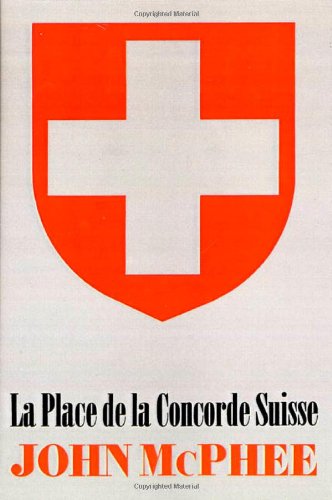Switzerland was about as neutral in those days as had been Mongolia under Genghis Khan… They were so chillingly belligerent that even if they were destroyed in battle they had been known in the same moment to win a war. One afternoon in mid-Renaissance, a few hundred Swiss who were outnumbered fifteen to one elected not to run away but to wade across a river and break into the center of their opposition, where all of them died, but not before they had slaughtered three thousand of their French enemies. The French Army was so unnerved that it struck its tents and fled. —John McPhee, La Place de la Concorde Suisse
The Swiss are wont to say, John McPhee tells us in La Place de la Concorde Suisse, “Switzerland does not have an army. Switzerland is an army.”
The country intermingles two cultures: the Suisse-romand are thoroughly French or Italian; while Suisse-allemand are German. Yet each partakes of the others to create that indefinable Swiss character. Perhaps, McPhee suggests, it is the defining background of each Swiss man’s life, the required military service.
The knife every soldier is issued today is jacketed with quilted gray aluminum, has one blade, a can opener, a bottle opener, a hole-punch, two screwdrivers and a corkscrew. On one side is a small red shield bearing a white cross… Officers included, everyone in the Swiss Army carries a Swiss Army knife.
Women may volunteer for the Swiss Army; if they do, they serve fifteen years doing “housewife work.” They drive trucks, for example, or operate radios. But men who refuse to serve (there are a small number each year) go to jail. Failure to be accepted into service is also considered shameful, and like serving time for conscientious objection, closes professional and financial doors to the disgraced party.
There is now a petition in circulation that calls for an initiative to abolish the army altogether. An initiative to abolish chocolate would stand an equal chance.
There are remarkably few graffiti in the country (although there is a famous one, Lord Byron’s name in his own hand, in a dungeon where he was prisoner), and electric sensors watch parking lots, urinals and hotel mattresses. The sensors signal availability, flush as needed, and turn out lights when you go to bed. “In Switzerland, everything works.”
In the Swiss Alps are countless airstrips, concealed hangers, mined bridges and clear-cut fields of fire. It is often the case, McPhee informs us, that the engineer who creates a strategic structure will then be given the task of planning its destruction. The Alps are not the barrier to invasion that they once were—the Swiss Army must supply the balance now, adapting to newer technologies.
But the Alps are still formidable, particularly when supplied, valley and town, canton and city, with the ready defense of the Swiss Army.
Crystallizing and recrystallizing, the ice among the peaks collects and compacts itself into the Grosser Aletsch-gletscher, the supreme glacier of Europe, with avenues of ice coming in from six or eight directions to conjoin in … Konkordiaplatz, La Place de la Concorde Suisse… This place that will never need defending represents what the Swiss defend.

No comments:
Post a Comment